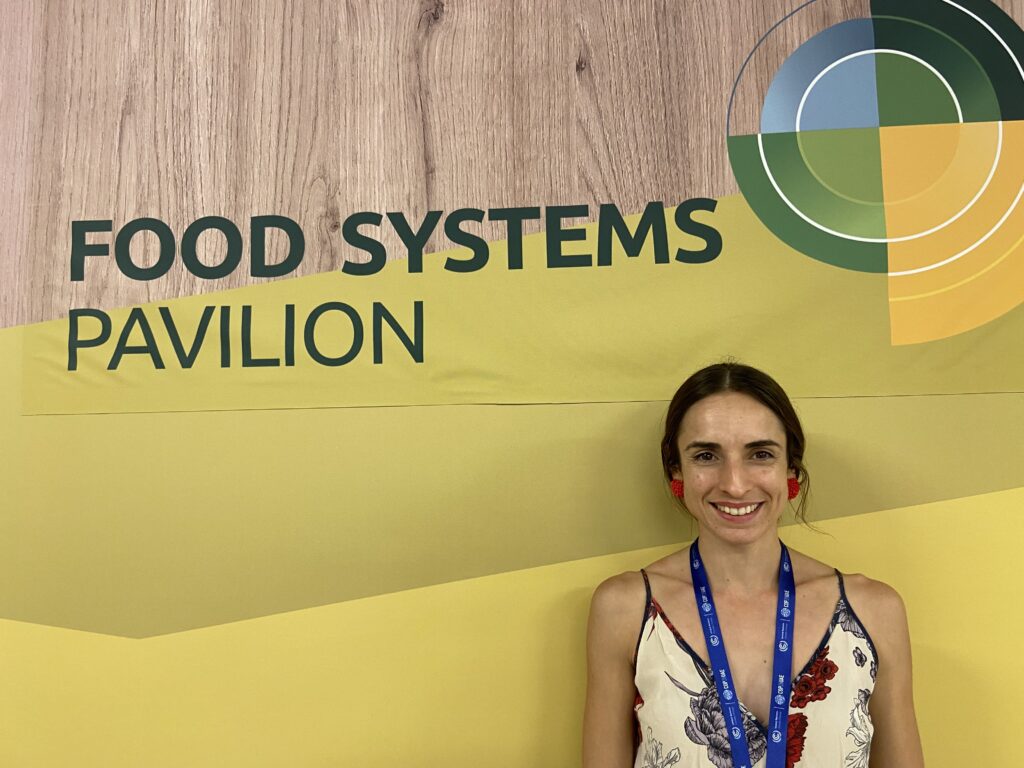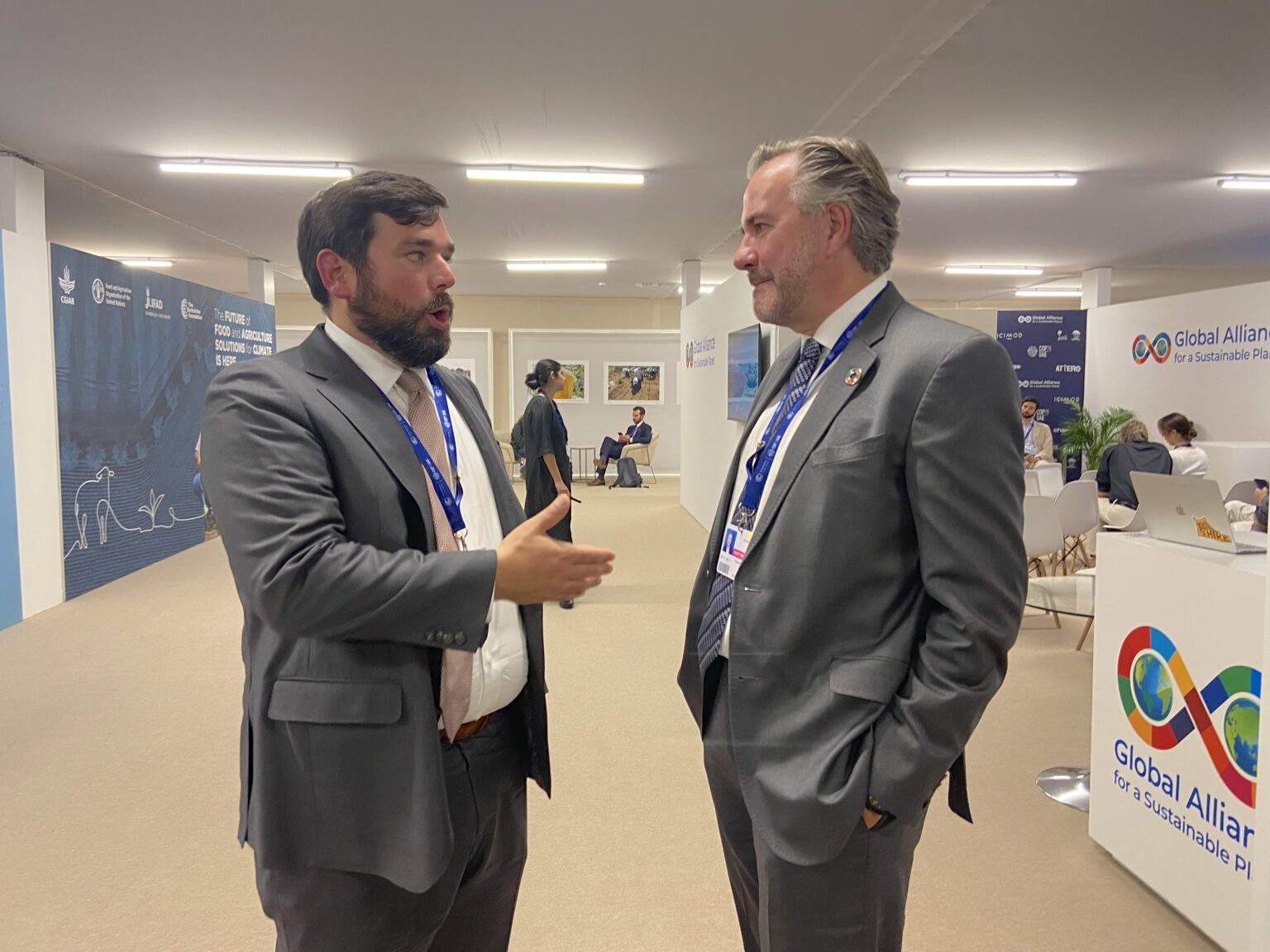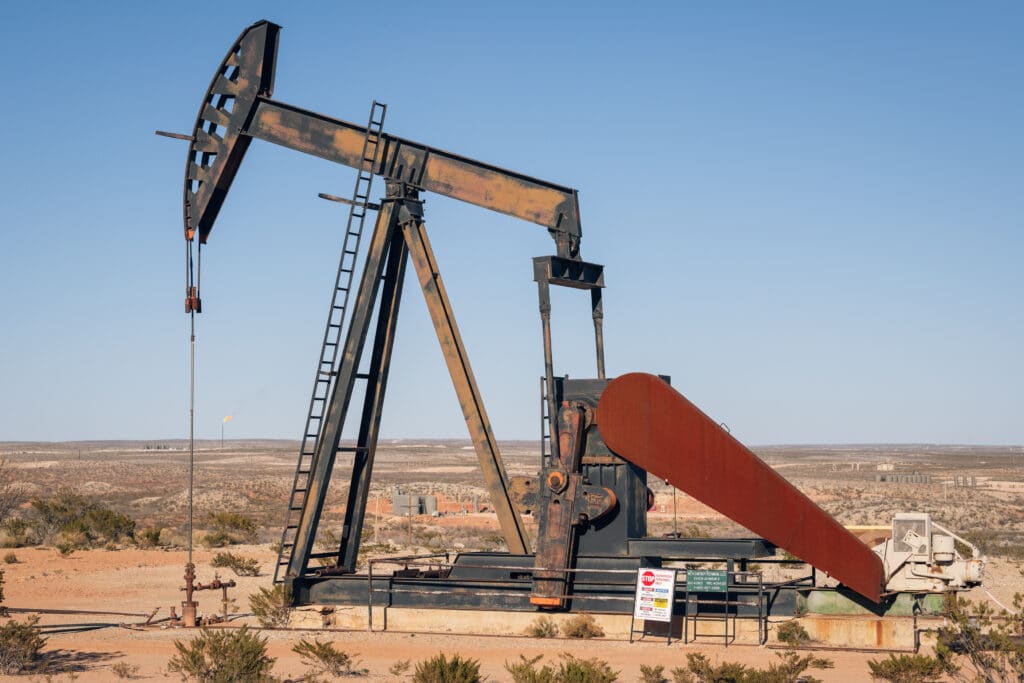DUBAI, UNITED ARAB EMIRATES —
Lobbyists from industrial agriculture companies and trade groups have turned out in record numbers at COP28, which this year has a strong focus on tackling emissions from the food sector.
Attendees are present from some of the world’s largest agribusiness firms – such as meatpacker JBS, fertiliser giant Nutrien, food firm Nestlé and pesticide manufacturer Bayer – and powerful industry trade groups.
Meat and dairy interests are especially well represented with 120 delegates in Dubai, triple the number that attended COP27 in Sharm El-Sheikh, Egypt.
Overall the analysis of the delegates list by DeSmog shows that the total number of people representing the interests of agribusiness has more than doubled since 2022 to reach 340.
In addition, the analysis reveals that over 100 delegates have travelled to Dubai as part of country delegations, which grants privileged access to diplomatic negotiations. This number is up from just 10 in 2022.
The findings of the UN’s climate science body the IPCC show that the long-term goals of the Paris Agreement cannot be met without climate action on food.
Meat and dairy firms in particular are coming under increasing scrutiny due to pollution from livestock, which emits around a third of the global output of methane, a short-lived greenhouse gas identified as the quickest route to slowing global heating.
“With greater scrutiny over emissions from meat and dairy companies, it is not surprising they are stepping up their game to head off any COP outcome that might hinder their operations,” Ben Lilliston, from the Institute for Agriculture and Trade Policy told DeSmog.
“Even so, a tripling of delegates is alarming – it drives home the urgent need for reforms that limit corporate influence at UN climate meetings.”
Meat isn’t the only industry under the spotlight. Farmers, retailers, and processors also drive greenhouse gas emissions by clearing trees, using fossil-fuel derived synthetic fertilisers and in transport, packaging and storage.
Karina Gonçalves David, a small-scale farmer representative from Brazil who has travelled to Dubai, is concerned by the presence of powerful and polluting firms. “If they are inside, they have an advantage,” she says. “This place is about solutions to face the climate crisis but the companies are appropriating it to do lobbying. They are going the opposite way.”
Outsized Agribusiness Influence
DeSmog’s analysis found an uptick in attendance by companies across the industrial food and farming sector.
Industrial meat and dairy groups have brought 120 delegates to the talks – this far outstrips the 80-strong delegation of Barbados, a small island in the Caribbean that is highly vulnerable to climate impacts.
The world’s top five meat companies’ emissions are estimated to be significantly larger than those of oil giants Shell and BP while the dairy industry’s 3.4 percent contribution to global human-induced emissions is a higher share than aviation.
The world’s largest meat company JBS brought 11 delegates – including its chief executive Gilberto Tomazoni – up from four in 2022. The Brazilian meat giant, which is under pressure for its outsized climate and environmental impacts, was recently ordered to retract net zero claims by a U.S. ad body.
Outspoken meat lobby groups are also on the ground in Dubai. They include the North American Meat Institute, which as recently as 2022 claimed the extent of man-made climate change was “unknown”, and delegates attending under the umbrella of the Animal Agriculture Alliance, which has claimed meat is “villainized”, and its climate impacts exaggerated.
The world’s second largest dairy company and largest food processor Nestlé also hiked its delegates to 14 this year, up from just two in 2022 – including its chief executive Ulf Markus Schneider.
Pesticide firms also turned out in high numbers this year, jumping by 30 percent compared to 2022. Bayer, Syngenta, BASF and their trade association CropLife – which has pushed back against attempts to enact new climate measures – sent 29 delegates.
Bayer, which is the world’s second largest pesticides producer – brought 16 delegates – more than the East African country of Eritrea.
The synthetic fertiliser industry has also seen a steep rise in representatives. The analysis found 40 delegates are attending the UN talks in 2023, up from just 13 last year.
A spokesperson from Bayer said it had brought delegates from across all divisions of its business to help fight climate change. “We are represented in Dubai because two of the most important issues in combating climate change are its impact on the health and nutrition of a growing world population,” they said, adding that Bayer had set itself “ambitious sustainability targets and is well on its way to achieving them”.
A Nestlé spokesperson told DeSmog: “Our very small delegation at COP28 is focused on food systems. We are committed to scale up efforts to make food production and agriculture more sustainable and resilient”.

Food Agendas
Delegates from agribusiness join over 84,000 participants at this year’s summit, which is being held in Dubai’s state of the art $8 billion Expo City over four square kilometres. Overall numbers of attendees have doubled since COP27 – and also include over 2,400 delegates linked to fossil fuel industries.
“Just as with the influx of oil lobbyists, industrial agriculture businesses are scared,” said Raj Patel, panel expert with sustainability think tank IPES-Food and professor at the University of Texas-Austin. “They’ve read the science and they know how much their business has driven the climate crisis.”
Big food and farming representatives are keen to steer conversations away from dietary change, which is under discussion at the summit. At Food, Water, and Agriculture Day on December 10, the UN’s Food and Agriculture Organisation is set to release the first draft of its roadmap to achieving a 1.5 C-aligned global food system, which is expected to call on rich nations to cut meat consumption.
This follows the recommendation of the EAT-Lancet Commission, which suggests people consume no more than 15.7 kg per year – in 2020, the average person in the U.S. consumed 126 kg of meat, while Nigerians ate around 7 kg.
Last week, more than 130 countries also pledged to include food system emissions in their climate reduction plans.
Ahead of the summit, DeSmog and The Guardian reported that industrial meat and dairy companies and their affiliated lobbying groups were preparing a major campaign to convince policymakers that meat was good for the environment.
Smallholder farmers are worried they will be sidelined by the power of the agribusiness lobby. A recent report showed small-scale producers get just 0.3 percent of international public climate finance despite producing a third of the world’s food.
“Family farmers are already rolling out more diverse and nature-friendly practices which the UN’s IPCC says is needed,” said Esther Penunia, Secretary-General of the Asian Farmers’ Association for Sustainable Development, an alliance of organisations representing 13 million family farmers.
“Yet our concerns, and the solutions we are putting forward, are being drowned out. We struggle for our voices to be heard above the voices of those with more money and more power.”
Privileged Access to Negotiations
Most corporations, lobby groups, and NGOs that attend the COP climate summits have “observer” status.
But DeSmog’s analysis shows a surge in the number of industry representatives who are attending COP28 with their country governments, making companies and lobby groups party to diplomatic negotiations.
Participating as country delegates, Nusa Urbancic from the Changing Markets Foundation explains, means that industry may be perceived more as peers by policymakers who then “give greater credibility” to their positions.
In total, 102 industry representatives are in Dubai as part of country delegations, 30 percent of the sector’s total. In 2022, they made up less than six percent.
The highest numbers of agribusiness representatives were brought in by Brazil, with 36 delegates linked mostly to the meat industry. It brought in nine employees of JBS compared to just one last year (a further two JBS staffers came in with other groups). Brazil also brought 12 representatives of meat company Minerva.
Next in line was Russia, which handed out 15 passes to people affiliated with fertiliser companies and lobby groups, followed by Canada, which offered tickets to eight more delegates from fertiliser firms.
Nitrogen fertiliser, which is made from natural gas, is mostly used to grow cereal crops, which Russia and Canada export in high volumes. It also contributes roughly two percent of all global greenhouse gas emissions.
Dairy companies also found willing hosts in country governments. China handed out four passes to Yili Group and Mengniu Group, which are listed in the top 10 dairy companies in the world. France gave country badges to dairy giant Danone (and supermarket chain Carrefour) while Denmark brought in dairy firm Arla and New Zealand gave three seats to Fonterra.
As the host country, the UAE brought the largest delegation in the summit’s history. Its 4,400+ guests included several agribusiness executives including Juan Luciano, the chief executive of major commodity trader Archer Daniels Midlands, and Michael Gelchie of commodity firm Louis Dreyfus.
Other nations that brought in powerful agricultural representatives include: Kazakhstan, which brought fertiliser firm EuroChem; Singapore, which brought agribusiness giant Olam; Guinea, which brought Cargill; and Namibia, which brought two representatives of Coca Cola. Pesticide company Syngenta’s Foundation came with Ukraine.
“They are here because they knew it would be a food COP,” said Fabricio Muriana from Brazil’s Instituto Regenera, who is attending as an observer with the Global Alliance for the Future of Food. “It’s a cynical move because these people are not even beginning to scratch the surface of reducing harm, let alone addressing climate. We need stricter criteria on who is coming, and with what intentions.”
Glenn Hurowitz, the chief executive of Mighty Earth, told DeSmog: “There is no better expression of the meat industry’s regulatory capture of government than their ability to be included in official delegations.
“Governments should be representing their people and their environment. Not the private interests of the biggest polluters on the planet.”
Pushing for Voluntary Action and Innovation
Big food companies have announced a handful of voluntary initiatives at COP28. One is the UAE and U.S-led AIM for Climate partnership, which has been criticised for skewing heavily towards techno-fixes and commercial interests of large corporations.
Another is the multi-million “Regenerative Landscapes” initiative launched in Dubai on Tuesday, which includes 17 major corporations, including Olam, Unilever, Yara, and Nestlé. It pledges to apply nature-repairing farming techniques to an area three times the size of France, but appears to lack concrete and time-bound targets to phase out harmful environmental practices.
“The narratives and solutions that Big Ag is pushing will only maintain a disastrous status quo,” Greenpeace’s Sophie Nodzenski says, adding that allowing companies into policymaking circles inevitably favours voluntary initiatives over more robust measures. She warns policymakers to “see beyond the greenwashing when designing solutions to curb emissions from food systems”.
At the summit, six of the world’s largest dairy companies also committed to disclose their emissions, but fell short of setting targets to cut the sector’s methane pollution, which accounts for 10 percent of the global total. Campaigners point out that the dairy industry has plans to grow by over 70 percent in the next decade.
French dairy giant, Danone, is the only major company outside the oil and gas industry currently to have a methane reduction target.
A spokesperson from Nestlé said: “Nestlé’s own commitments include sourcing 50% of its key ingredients from regenerative agricultural practices by 2030 to halve emissions by 2030.”
A spokesperson from Danone said: “We believe that food companies have a key role to play to drive sustainable transformation of food systems, and that’s why we actively participated in the COP agenda, working with other companies and NGOs on initiatives to reduce emissions – especially methane emissions in dairy – and scale the adoption of solutions such as regenerative agriculture.”
Fertiliser company Yara told DeSmog it had reduced greenhouse gas emissions by 45 percent since 2005, adding: “There is a tremendous urgency to reduce emissions, and we believe that we are a part of the solution. We see regenerative agriculture as the best systematic approach to adopt sustainable farming practices that affects nature and climate in a positive way.”
The Bigger Picture
DeSmog’s findings were produced through an analysis of the COP28 delegate list, which includes over 81,000 entries.
The list was analysed for the largest corporations in major food sectors – meat and dairy, pesticide and fertiliser firms, food processors, commodity and seed traders, and grocery retail – which wield significant control in a highly concentrated food chain, and account for the majority of trade.
In addition, DeSmog also included global and regional industry trade groups, some of which brought their own delegations to Dubai, along with national farmer unions and institutes that have corporate affiliations and/or a history of lobbying aligned with industry demands.
But DeSmog’s analysis only gives a snapshot of the industrial agriculture sector’s influence.
Agriculture and trade ministers, which fell outside the scope of DeSmog’s analysis, have been fierce advocates for the interests of agribusiness at UN fora in recent years.
Government officials from Brazil and Argentina – both major producers of beef – pushed to water down scientific recommendations about reducing meat-eating in the latest report from the Intergovernmental Panel on Climate Change (IPCC).
The U.S. Secretary of State Tom Vilsack, a former dairy lobbyist, told industry groups ahead of COP28 that the U.S. would use COP to advocate for its market-based approach to agricultural policy, which shuns calls for regulation of industries like meat and dairy.
Ireland’s Minister of Agriculture, Charlie McConalogue, is in attendance at COP28 this year, along with several other departmental representatives. Documents uncovered by the Changing Markets Foundation suggest that the Irish government used discussions around methane at COP26 to push for the controversial GWP* metric, which has been criticised as a way for long-standing polluters to evade cutting methane.
“They are running way ahead of us,” reflects small farmer Gonçalves David. “But the agroecology movement in Brazil, and in the world, does a lot without much support. Not only in COP but in our territories. So if the focus was on us, we could make a big transformation happen. If we had the same opportunity, we could catch up.”
Methodology note available here. DeSmog dataset is available on request.
Subscribe to our newsletter
Stay up to date with DeSmog news and alerts







